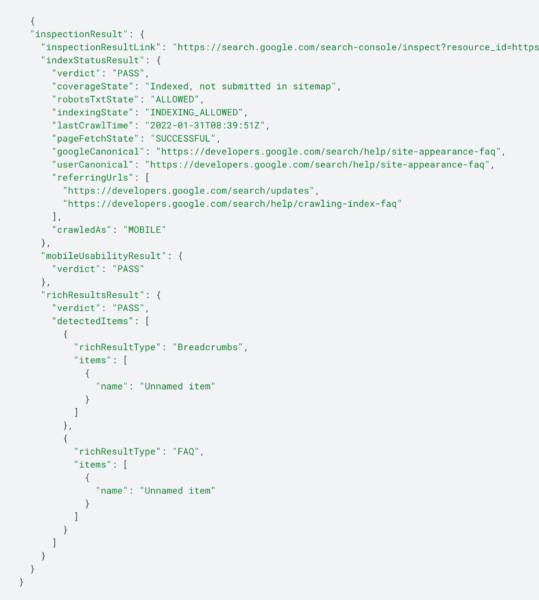Google releases URL Inspection Tool API
You can now programmatically access the data you’d request from the URL Inspection Tool within Google Search Console.
Google has released a new API under the Search Console APIs for the URL Inspection Tool, the search company announced this morning. The new URL Inspection API lets you programmatically access the data and reporting you’d get from the URL Inspection Tool but through software, like any API would.
API limits. The API has limits, so you can’t just run it on every URL on every site in a single day. The API has a 2,000 queries per day and 600 queries per minute limit. So don’t expect to run it against your whole entire one-million page website today. You will have to queue things up or run it on as needed basis.
Use cases. Google provided some use cases for the API, they include:
- SEO tools and agencies can provide ongoing monitoring for important pages and single page debugging options. For example, checking if there are differences between user-declared and Google-selected canonicals, or debugging structured data issues from a group of pages.
- CMS and plugin developers can add page or template-level insights and ongoing checks for existing pages. For example, monitoring changes over time for key pages to diagnose issues and help prioritize fixes.
The results. The API will return indexed information from the URL Inspection Tool including index status, AMP, rich results, and mobile usability. You can see the full list of responses over here in the API docs.
More details. You can learn more about this API in the API documentation over here. Here is a sample API response:

Why we care. You can now programmatically add the URL Inspection details to your content management system, internal tools, dashboards and third-party tools can add integration as well. Expect a number of tool providers and content management systems to start adding features.
And if you have ideas, feel free to build them out yourself.
New on Search Engine Land
Google merges its SafeSearch help information into a single new document
‘Untitled’ search results sending users to spam sites, Google ‘working on it’
Messy SEO Part 6: Pillar pages and topic clusters
Building trust builds brands: SEO link-building strategies that work
Google allows ads for sports betting in Louisiana







